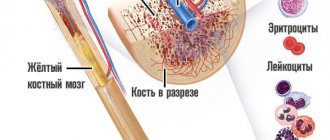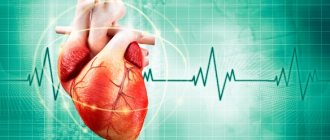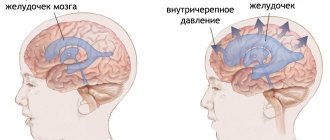The thyroid gland can shorten life by decades if you do not pay attention to symptoms indicating a malfunction in its functionality for a long period of time.
To prevent premature mortality, you should know what it is - thyroid hypertension. Thyroid hypertension is a hormonal imbalance in the body, accompanied by high blood pressure. If there are deviations in the performance of this system, serious pathological diseases may appear, manifesting not only clinically, but also externally.
The influence of the endocrine system on blood pressure
The human endocrine system is represented by:
- pituitary;
- pancreas;
- hypothalamus;
- adrenal glands;
- male and female gonads;
- thyroid.
All these organs are connected to important body systems. Hormonal balance in a person is very important; when it changes in one direction or another, it disrupts the functioning of many organs.
The thyroid gland plays an important role in regulating physiological processes in the body. Affects blood pressure and heart function. When the balance of the hormones thyroxine and triiodothyronine produced by the thyroid gland is disrupted, disorders occur in the human body. Arterial hypertension with complications such as heart attack and stroke occurs more often from them.
Hormones that cause increased blood pressure
Hypertension affects many people, especially older people. In the chronic form of the disease, 0.3% of people with arterial hypertension experience an increase in blood pressure due to increased levels of the thyroid hormones thyroxine and triiodothyronine in the blood. This condition is called an overactive thyroid.
The coordinated work of the gland, heart and blood vessels is immediately disrupted. The patient complains of arterial hypertension, which occurs due to frequent heart contractions and narrowing of the lumen of blood vessels. The patient may feel cheerful, his performance improves, and his thinking processes accelerate. If the pressure rises for a short time, this condition is not dangerous. However, the long-term increase in blood pressure caused by hypertension leads to irritability and restlessness. A person develops a state of panic attacks.
In addition, hyperthyroidism leads to metabolic disorders, which affects the condition of blood vessels. Possibility of atherosclerosis, if carbohydrate metabolism is disturbed - diabetes mellitus.
Excessive production of thyroid hormones has dangerous consequences. After all, high blood pressure leads to fragility of blood vessels and changes in the heart muscle. The patient undergoes irreversible processes, which contributes to the development of heart attack and stroke.
Hormones and low blood pressure
A decrease in the blood level of the hormones thyroxine and triiodothyronine can be a temporary phenomenon when the body reacts to extreme heat, lack of food or water, or poisoning.
Chronic hypothyroidism causes significant damage to body functions. As a result of hormone deficiency, the heart begins to work more slowly and the tension in the blood vessels decreases. Parts of the brain run out of oxygen, and the patient's performance quickly declines. He is constantly depressed. Low blood pressure leads to dizziness and fainting.
It is characteristic that the patient’s body temperature also decreases from normal. Slow metabolic processes lead to loss of appetite, although a person gains weight faster than loses it.
Hypothyroidism
If the cause of the disease is decreased thyroid function (hypothyroidism), it is a hypothyroid goiter. The development is associated with chronic thyroiditis and treatment of thyrotoxicosis. Also, the cause may be a congenital anomaly. Among the signs are the appearance of chilliness regardless of weather conditions, excessive weakness, fatigue, and constipation.
Hypothyroidism is characterized by the development of mental retardation, decreased attention, forgetfulness, and depression may develop. A woman with this diagnosis experiences disruption of her menstrual function and is unable to conceive or bear a child. The skin becomes dry, the fragility of hair and nails increases. The face, shoulders, and legs swell.
If you press on the swollen area, a hole will not appear and the skin will not gather into a fold. This phenomenon is called myxedema (a mucous, mucopolysaccharide-rich substance accumulates). Swelling of the tissues causes damage to the sensory organs - vision, hearing are impaired, the voice is low, the person begins to snore at night. Among the external signs one can highlight the presence of a round moon-shaped face, dry pale skin, and sparse hair.
Hypothyroidism is a common condition where insufficient amounts of thyroxine are produced. This situation is dangerous due to serious metabolic disturbances. If you contact the clinic in a timely manner, this can be quickly corrected using modern means.
Symptoms of high and low blood pressure
The endocrine nature of pressure changes in an ascending or descending direction can be determined by a number of symptoms. The patient was diagnosed:
- changes in heart rhythm - tachycardia or bradycardia;
- discomfort in the chest area;
- increased or decreased body temperature;
- migraine;
- mood swings;
- shortness of breath;
- fatigue;
- unmotivated depression.
These symptoms cannot be ignored; you must urgently visit an endocrinologist and check the amount of thyroid hormones in the blood. The malfunction of this organ affects the condition of the heart and blood vessels. Therefore, there is no need to postpone medical examinations.
Signs of increased blood pressure from the thyroid gland
Increased pressure due to the thyroid gland is accompanied by many symptoms:
- high blood pressure, sometimes intracranial pressure rises;
- heartbeat becomes rapid with pain;
- increased irritability and nervousness;
- discomfort in the chest area;
- chronic migraine;
- increase in body temperature to subfebrile levels;
- convulsive state;
- inability to satisfy the feeling of hunger;
- eyeballs protrude;
- a goiter forms;
- severe shortness of breath;
- fast fatiguability.
The thyroid gland is a glandular tissue; its cells can synthesize substances that have strong chemical activity
Hypothyroidism has characteristic symptoms, on the basis of which differential diagnosis can be made:
- low pressure;
- the intensity of the heartbeat decreases;
- absent-mindedness and drowsiness develop;
- depressive states;
- fainting may occur;
- headache;
- nausea with vomiting;
- swelling of the limbs;
- overweight;
- low temperature, especially in the extremities.
Causes that lead to malfunction of the thyroid gland
Among the main reasons leading to dysfunction of the thyroid gland is iodine deficiency in the body. A deficiency of this substance occurs as a result of:
- Iodine deficiency in the food we eat;
- radioactive exposure;
- use of oral contraceptives;
- bad habits.
The thyroid gland stops working normally due to poor environmental conditions and frequent stress. If a person is constantly sick with autoimmune or infectious diseases, the gland produces more or less hormones. Heredity also plays an important role in endocrine dysfunction.
Stages of thyroid lesions
Thyroid dysfunction manifests itself in different ways. There are a number of diseases of the endocrine system, among which the most common can be listed:
- goiter of endemic and sporadic type;
- Hypothyroidism and hyperthyroidism with excess or insufficient production of hormones;
- inflammation of the gland - inflammation of the thyroid gland in acute and chronic forms;
- open and closed injuries;
- Congenital anomalies of the thyroid gland.
As the thyroid nodules enlarge in the first stage of development, the symptoms become mild, but over time the thyroid gland grows, which leads to cancer.
And persistent viral infections lead to an enlargement of the thyroid gland. The malaise begins with a sore throat. But if the patient is irritable, has excessive sweating and trembling in his hands, the inflammation has moved to the thyroid gland and subacute thyroiditis develops.
Among autoimmune pathologies, Hashimoto's goiter deserves attention as a consequence of chronic infections. Failure of the immune system leads to the destruction of gland cells, hypothyroidism. This disease is hereditary and difficult to treat.
Timely diagnosed diseases of the endocrine organs will prevent complications and not lead to disastrous consequences.
Hyperthyroidism
If the cause of goiter is increased thyroid function (increased amount of thyroid hormones), it is called diffuse toxic goiter, or hyperthyroidism. Symptoms are similar to thyrotoxicosis. Among the characteristic signs are sudden weight loss, disrupted functioning of the gastrointestinal tract (more frequent stools, nausea and vomiting). In addition, the person becomes irritable, his sleep deteriorates, he often has a headache, and dizziness appears.
External signs of hyperthyroidism are the presence of shiny, protruding eyes, a person’s hands tremble, and a goiter is visible to the naked eye. Also, there is an increase in heart rate, an increase in systolic pressure and a decrease in diastolic pressure. Arrhythmia may develop. In most cases, there is a sharp pain in the muscles.
Diagnosis of thyroid hypertension
When a patient complains of a persistent increase in blood pressure, which does not decrease even when taking potent medications, he is referred for diagnosis of thyroid diseases.
Laboratory diagnostics
A blood test for the amount of hormones is important because with its help we find out the condition of the gland. The test also shows the presence of antibodies to thyroxine and triiodothyronine receptors. They may be present in toxic, diffuse type of goiter and its progression.
A blood test for hormones is necessary for those who are at risk of pathology. On the eve of the procedure, you should not take medications containing iodine and iron. Coffee, alcoholic drinks, and smoking are prohibited before the test.
Based on these studies, preliminary conclusions were drawn. To confirm the diagnosis, they are sent for a thorough examination of the gland using modern devices.
Instrumental diagnostics
Diagnosis of the thyroid gland includes:
- Ultrasound examination of the organ. After examination, pay attention to the shape of the organ and whether its size has changed. Using the method, fillings and thyroid tumors are detected.
- Radiological examination. The size of the gland, its parts and the structure of the tissues are determined from the image on the screen using a special sensor that is placed around the neck in the area of the organ.
- X-ray. The rays penetrate deep into the tissue, determining the location of the gland when it is covered by a goiter. Using this method, tumors and cysts can be detected and their structure determined.
- Scintigraphy or research using radioisotopes. After administering a special substance, the device will show what the thyroid gland looks like, whether there are tumors on it and what type they are.
Careful diagnosis leads to the selection of effective treatment methods. By eliminating the cause of hypertension, doctors allow the patient to experience the taste of life.
Treatment methods for gland diseases
Thyroid diseases cannot be treated alone. Only a doctor will prescribe appropriate medications and treatment:
- Symptoms of an overactive thyroid gland are treated with propylthiouracil to stop the synthesis of hormones. A similar remedy is the drug Metamizole.
- In combination with antithyroid drugs, iodine-containing products such as iodomarin or iodide are prescribed.
- If a viral infection has affected the thyroid gland, non-steroidal drugs are prescribed, the action of which is aimed at eliminating inflammation and pain. Encortone, a synthetic steroid hormone, is also effective in relieving symptoms.
- Radioiodine therapy is necessary to reduce the size of the thyroid gland.
- Surgery is used to remove the goiter and nodules.
- If the goiter is non-toxic, it is sufficient to treat it with radioactive iodine.
- Among folk remedies, white teapot root is used as an addition to the main therapy. The prepared tincture is taken 30 drops per day for up to a month.
- To improve gland function in hypothyroidism, apply microwaves to the front of the neck or adrenal glands.
- Iodine electrophoresis for 15-20 minutes is also recommended. General ultraviolet irradiation, physiotherapy and massage help stimulate the gland.
By eliminating thyroid dysfunction, it normalizes blood pressure and normalizes heart function.
Disease Prevention
Prevention of endocrine system diseases is available to all of us if:
- avoid stressful situations;
- control iodine content in the body;
- Include iodine-rich foods in your diet: sea fish, seaweed, herbs and vegetables;
- Take multivitamin complexes, especially in the off-season;
- Treat colds in a timely manner, do not wear them on your feet;
- Regular hygiene of the oral cavity and nasopharynx, as foci of chronic infections;
- Give up bad habits.
A person’s life and health depend on the condition of the thyroid gland. Therefore, it is necessary to ensure that this organ is not damaged by injury or poisoning, and that the body always has enough iodine for the functioning of the thyroid gland.
Myths about the thyroid gland. We read, we check, we don’t believe
Myth No. 2. A daily drop of iodine perfectly compensates for the deficiency of the element
Do not overestimate the need of the thyroid gland for iodine. A drop of not even pure iodine, but the tincture sold at the pharmacy, will contain almost a month’s worth of this element! Such an amount will completely block the functioning of the gland. The daily iodine intake for prevention of people over 12 years of age is 200 mcg, and for pregnant women – 250 mcg. By the way, iodine contained in seafood, for example, is safe, so you can eat kilograms of these products. If, of course, you like conventional seaweed in such quantities. If it is winter outside or your diet for other reasons lacks fresh herbs, vegetables or fruits, multivitamins or medications prescribed by your doctor, for example, sodium levothyroxine or potassium iodide, will do. It is important to remember that each case is individual, the medicine must be selected by a specialist!
Myth No. 3. Iodine mesh helps the thyroid gland
A very popular way to treat anything in our country is an iodine mesh. But not only does it rarely help, it can also cause harm, especially if applied in the neck area! A large amount of iodine that penetrates the body is fraught with the occurrence of gland pathology.
Myth No. 4. A lump in the thyroid gland is cancer
Do not confuse malignant and benign tumors. In most cases, it is a benign goiter that occurs in the thyroid gland. An enlarged thyroid gland in men and women is a reason to contact an endocrinologist, sign up for an ultrasound and take a test for antibodies to hormones. An enlarged goiter does not necessarily indicate cancer.
Myth No. 5. The thyroid gland is fraught with problems only for adults
It's a delusion.
Lack of hormones can even be congenital. Without surgical treatment, irreversible physical and mental complications are possible. Other diseases are possible, for example, the risk of diabetes also increases. If a large child was born, if he is apathetic and suffers from constipation, if his reaction to the outside world is inhibited or absent, it’s time to sound the alarm. But even if these symptoms are not so pronounced, for example, the child simply seems overly calm, rarely cries and sleeps a lot, it is important to track the situation at an early stage. Myth No. 6.
Bulging eyes are the first sign of hyperthyroidism. Hyperthyroidism or Graves' disease is a disease that is caused by an overactive thyroid gland. Symptoms include ophthalmopathy (bulging eyes), however, firstly, this is an optional symptom, and secondly, cause and effect should not be confused. People with a healthy thyroid gland can suffer from ophthalmopathy.
Myth No. 7. Removing the thyroid gland ruins a person’s life
But here everything is completely different. The only thing that threatens a person with a removed thyroid gland is lifelong use of pills that make up for its functioning. There will be no other difficulties. Moreover, we must understand that surgical removal is not the only way to treat hyperthyroidism. Treatment with radioactive iodine is possible, or drug therapy is possible, which is most often the starting point.
In any case, if you notice any symptoms, do not panic, do not self-medicate under any circumstances, but consult a specialist.










